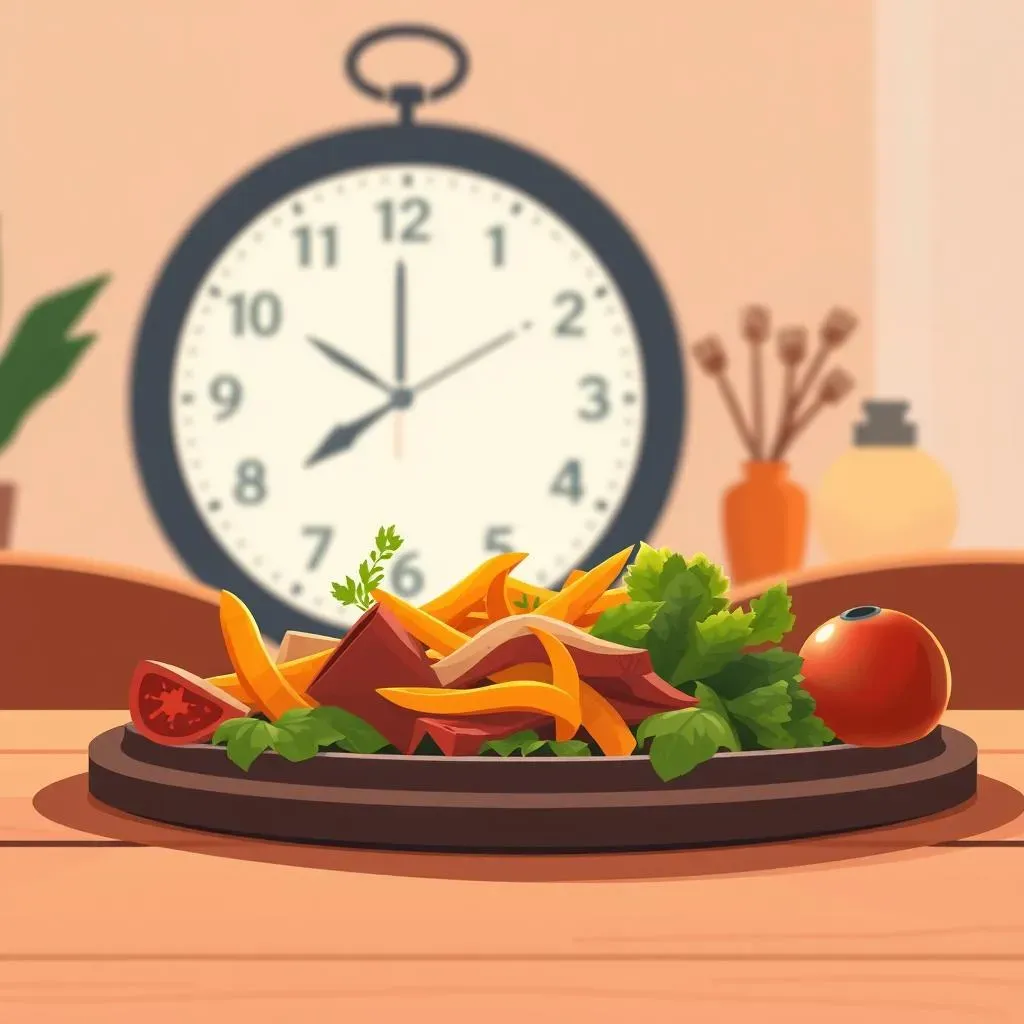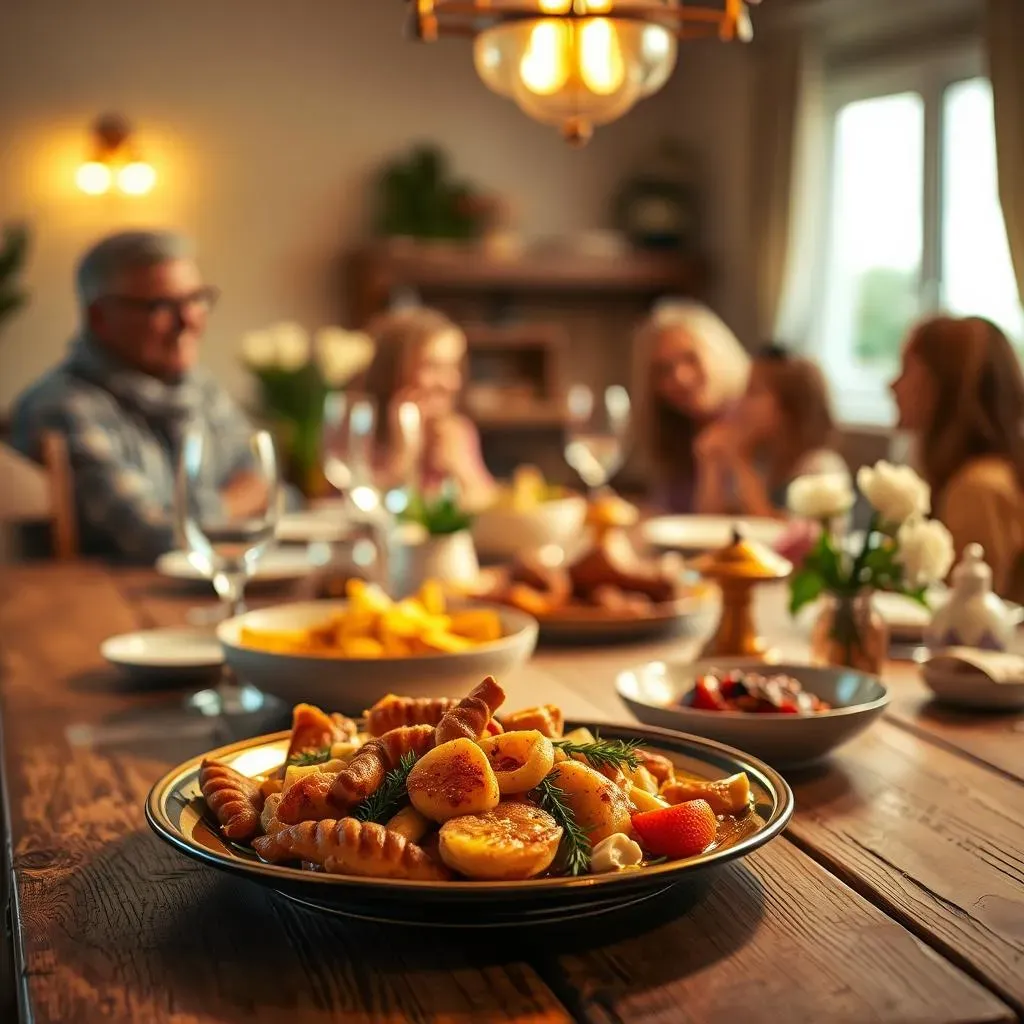Table of Contents
Ever wonder if your late-night dinner habit is doing you any favors? We've all been there, scarfing down food just before bed, but what if I told you that shifting your mealtime could be a game-changer? The question "is it healthy to eat dinner early" isn’t just a fleeting trend; it's rooted in science and ancient practices. In this article, we'll look at the surprising benefits of eating dinner earlier, exploring how it can affect everything from your sleep to your weight and even your risk of certain diseases. We'll break down the science, highlight nine amazing advantages, and give you practical tips to make this shift in your routine. Forget the food coma; let's see how eating before sunset could actually energize your life, one early dinner at a time. So, are you ready to discover why an early dinner might just be the best thing you do for your health this year?
The Science Behind Eating Dinner Early

The Science Behind Eating Dinner Early
The Circadian Rhythm Connection
Okay, so you know your body has this internal clock, right? It's called the circadian rhythm, and it basically dictates when you feel sleepy and when you're wide awake. Turns out, this clock also influences how your body digests food. Eating late throws a wrench into this system, making it harder for your body to process food efficiently. Think of it like trying to run a marathon at midnight – your body's just not geared up for it. It prefers to do the heavy lifting of digestion during daylight hours, when you're more active. This is why eating in sync with your circadian rhythm is crucial, and that usually means having dinner earlier rather than later.
Metabolism and Insulin Sensitivity
Here's where things get interesting. When you eat late, your body is less sensitive to insulin, the hormone that helps your cells absorb sugar from your blood. This can lead to higher blood sugar levels, which over time, can increase the risk of type 2 diabetes. Eating earlier, when your body is more insulin-sensitive, helps keep those blood sugar levels in check. Plus, your metabolism tends to be more efficient earlier in the day. So, rather than storing that late-night pizza as fat, your body is more likely to use the energy from your food when you eat earlier. It’s like giving your body the fuel it needs when it actually needs it, not when it’s winding down for the night.
Key Factor | Impact of Eating Late | Impact of Eating Early |
|---|---|---|
Circadian Rhythm | Disrupted digestion, poor sleep | Optimized digestion, better sleep |
Insulin Sensitivity | Decreased, risk of high blood sugar | Increased, better blood sugar control |
Metabolism | Slower, more fat storage | Faster, more energy utilization |
The Digestive Rest Period
Finally, think about your digestive system like a hardworking employee. It needs breaks too! Eating late means your digestive system is working overtime while you're trying to sleep, which can lead to indigestion, acid reflux, and just overall discomfort. Giving your digestive system a longer rest period overnight by eating dinner earlier allows it to recover and prepare for the next day. It’s like letting your body’s internal machinery cool down before the next shift. Plus, this rest period can also help improve your gut health, which plays a massive role in your overall well-being. So, an early dinner isn't just about what you eat, but also about when you give your body a break.
9 Amazing Benefits of Eating Dinner Early

9 Amazing Benefits of Eating Dinner Early
Okay, so you're on board with the science, right? Now, let's get to the really exciting part: the actual perks of eating dinner early. I mean, beyond just feeling like you're being all responsible and stuff. First off, it's a sleep superhero. Seriously, eating earlier can drastically improve your sleep quality. When you're not digesting a big meal all night, your body can relax and get into that deep, restorative sleep we all crave. No more tossing and turning because your stomach is doing the cha-cha. Plus, you're less likely to oversleep, which means more time to tackle your day. And let's be honest, who doesn't want more time in the morning?
And it's not just about sleep. Eating dinner early can also be a total game-changer for weight management. It’s like giving your metabolism a little kickstart, helping your body burn calories more efficiently. Plus, you're less likely to reach for those late-night snacks when you've already had a satisfying dinner a few hours before. Think about it: you’re not battling those midnight cravings because your body isn’t confused about when it’s supposed to be getting fuel. This can also reduce the risk of diabetes and heart attacks, which is a pretty big win in my book. It’s like giving your body a break and letting it do its job properly, without all the extra stress.
Benefit | How It Helps |
|---|---|
Improved Sleep | Better quality, less tossing and turning |
Weight Management | Boosts metabolism, reduces late-night snacking |
Reduced Disease Risk | Lowers risk of diabetes and heart attacks |
But wait, there's more! Eating earlier can also be a digestive dream. Say goodbye to constipation and acid reflux because your body actually has time to process your food properly. It’s not trying to digest and sleep at the same time, which is a recipe for disaster. You'll probably notice you have a better appetite overall and that you feel lighter and more energetic. It's like your body is finally saying, "Thank you for not making me work overtime!" Plus, it can even boost your flexibility! I know it sounds weird, but when your digestion is smooth, your body feels less stiff and more ready to move. Who would have thought that eating earlier could make you feel like a ninja?
And here’s a big one: eating at least 2-3 hours before bedtime can seriously minimize the risk of heart attacks and even cancer. It’s not just about feeling better, it’s about living longer and healthier. Imagine, such a small change can have such a big impact! If you struggle to eat early, try a light dinner, maybe avoiding carbs after sunset. Think of it like giving your body a gentle nudge in the right direction. And, leaving a 12-14 hour gap between dinner and breakfast is a great way to boost your metabolism and manage your weight. It’s like giving your body a mini-fast overnight, which can really help it reset. This whole early dinner thing isn't just a fad; it's a holistic approach to health rooted in yogic habits. Even yoga teachers push it in their training programs. So, if you’re looking for a simple yet powerful way to improve your health, eating dinner early is definitely worth a try.
Is It Healthy to Eat Dinner Early: Practical Tips and Implementation

Is It Healthy to Eat Dinner Early: Practical Tips and Implementation
Start Small, Don't Overhaul
Okay, so you're sold on the idea of eating dinner earlier, but where do you even begin? It's not like you can just flip a switch and suddenly be eating at 6 PM if you're used to 9 PM dinners. The key is to start small. Try moving your dinner time back by just 15-30 minutes each week. This gives your body time to adjust without feeling like you're going through some kind of culinary shock. Think of it like learning a new dance – you wouldn't try the whole routine on day one, right? You start with the basic steps and gradually build from there. The same approach works here. Small, consistent changes are way more sustainable than a sudden, drastic shift.
Also, don't beat yourself up if you slip up sometimes. Life happens, and there will be days when an early dinner just isn't possible. The goal isn't perfection, it's progress. Just get back on track the next day. It's all about building a habit, not achieving some impossible standard. And remember, consistency is key. So, even if it's just a small shift, sticking with it will make a big difference in the long run.
Plan Ahead and Prepare
Another crucial tip is to plan your meals in advance. If you know you need to eat earlier, you can’t just rely on last-minute decisions. This might mean doing some meal prepping on the weekends, or at least having a clear idea of what you're going to eat each day. Think of it like packing for a trip: you wouldn't just throw random things into a bag at the last minute, would you? You make a list, plan your outfits, and make sure you've got everything you need. Meal planning is the same – it's about being prepared and having the right "tools" available when you need them. This helps you avoid the temptation of grabbing something quick and unhealthy late at night.
Also, consider involving your family or housemates in this. If everyone is on board, it's much easier to stick to an early dinner routine. Maybe you can even make it a fun activity, cooking together and enjoying the early evening hours. It's not just about changing your individual habits, it's about creating a supportive environment that makes it easier for everyone to thrive. Remember, it's always easier to reach your goals when you have a team supporting you.
Tip | Why It Helps |
|---|---|
Start Small | Allows gradual adjustment, more sustainable |
Plan Ahead | Reduces temptation of late-night unhealthy meals |
Involve Others | Creates a supportive environment |
Listen to Your Body and Be Flexible
Finally, remember that everyone is different, and what works for one person might not work for another. Pay attention to how your body feels when you eat earlier. Do you feel more energized? Are you sleeping better? Adjust your approach based on your individual needs and preferences. This isn't about following some rigid rule; it's about finding a rhythm that works for you. Think of it like tuning an instrument: you might need to tweak it a bit until it sounds just right. Your body is the same – you need to listen to its feedback and adjust accordingly. And, don't be afraid to experiment. Maybe you find that a light snack after dinner helps you feel satisfied without disrupting your sleep. The point is to find what works for you, not to blindly follow some rulebook. And remember, flexibility is key. There will be days when your routine is disrupted, and that's okay. The goal is to build a sustainable habit, not to achieve perfection.
So, to answer the question "is it healthy to eat dinner early", the answer is a resounding yes. But it's not just about the time you eat, it's also about how you approach it. Be patient, be consistent, and most importantly, be kind to yourself. It's about finding a healthy balance that works for you and your lifestyle.
Making Early Dinners a Sustainable Habit

Making Early Dinners a Sustainable Habit
Embrace the Lifestyle Shift
Alright, so you've dipped your toes into the world of early dinners, and you're starting to see some positive changes. But how do you make this a long-term thing, not just a fleeting experiment? It's all about embracing a lifestyle shift, not just a diet change. Think of it like switching to a new operating system on your computer – it's not just about installing new software; it's about changing the way you interact with your device. The same goes for your eating habits. It's not just about eating earlier; it's about integrating this practice into your daily life so it feels natural and sustainable. This could mean adjusting your work schedule slightly, planning social events around your new mealtime, or even changing your grocery shopping habits. The key is to make it a part of your overall routine, not just an isolated task. It's about making it your new normal, like brushing your teeth or going to sleep at a consistent time.
This shift also involves a change in mindset. Instead of seeing early dinners as a restriction, try to view it as an act of self-care. It's about prioritizing your health and well-being, which is a pretty powerful motivator. It's not just about what you're giving up (late-night snacks); it's about what you're gaining – better sleep, more energy, and a healthier body. Embrace the feeling of lightness and vitality that comes with eating earlier. It's like finally finding the perfect pair of shoes that fit just right – you feel comfortable, supported, and ready to conquer the world. And, remember, it's okay to have setbacks. The important thing is to keep moving forward, one early dinner at a time. It’s about creating a sustainable lifestyle, not achieving perfection.
Create a Supportive Environment
Another crucial aspect of making early dinners sustainable is creating a supportive environment. This isn't just about you; it's about the people around you. If you live with family or housemates, try to get them on board with your new routine. Maybe you can start cooking together more often, or establish a shared dinnertime. It's always easier to maintain a habit when you have support from the people you're with. It’s like having a workout buddy – you’re more likely to stick to your goals when you’re not going it alone. And, if your family is not on board, then maybe try to find some friends that are, and have dinner together.
Also, think about your social life. If you often go out to dinner with friends, maybe suggest meeting earlier, or explore restaurants that offer earlier seating times. It's about finding ways to integrate your new routine into your social life, not just isolating yourself in the name of health. This might involve some compromise and creativity, but it's worth it in the long run. And, if you do eat later sometimes because of social obligations, don’t beat yourself up about it. Just get back on track the next day. Remember, it's about progress, not perfection. It's about making your health a priority while still enjoying your life. And, remember, building a strong support system is the key to making any habit stick.
Aspect | Description |
|---|---|
Lifestyle Shift | Integrate early dinners into your daily routine, not just a diet change. |
Mindset Change | View early dinners as self-care, not a restriction. |
Supportive Environment | Involve family and friends, adjust your social life. |
Wrapping Up: Is Eating Dinner Early Right for You?
So, is it healthy to eat dinner early? The evidence certainly points towards a resounding yes, with a heap of potential benefits from better sleep and weight management to reduced risks of serious illnesses. It's not about deprivation, but rather about aligning your eating habits with your body's natural rhythms. While shifting to an early dinner might require some adjustments to your routine, the positive impact on your overall health and well-being could be significant. Experiment, listen to your body, and you might just find that moving your dinner time is the simple change that makes a huge difference. It's not a one-size-fits-all approach, but considering the advantages, it's definitely worth a try. Remember, small changes can lead to big results, and sometimes, the best health hack is just a bit of planning and an earlier dinner.